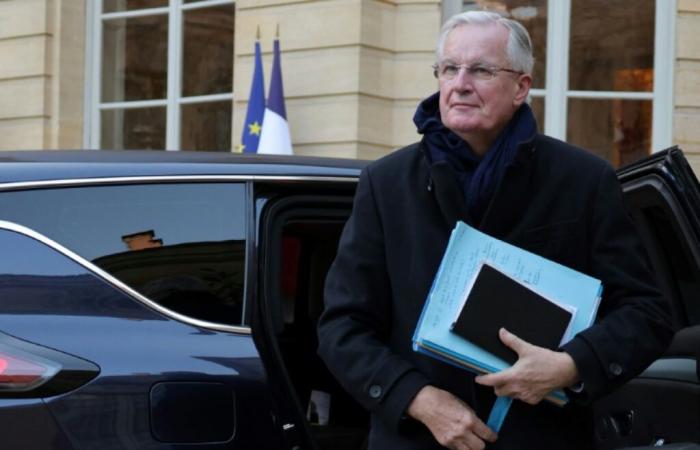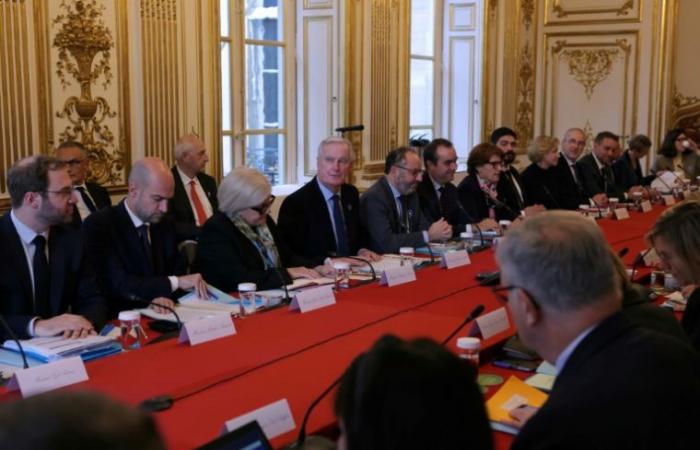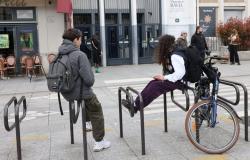French Prime Minister Michel Barnier upon his arrival Monday November 4, 2024 at the Hôtel de Matignon in Paris (AFP / Thomas SAMSON)
Michel Barnier brought together his ministers in a seminar on Monday morning with the aim of bringing out proposals to be implemented over three years by the end of the year, thus allowing him to plan beyond the current budgetary marathon which severely tests his coalition.
“Work” was the watchword of the ministers when they arrived in Matignon shortly before 9:00 a.m. The meeting was followed by a lunch which ended around 2:00 p.m.
Preoccupied since his appointment two months ago with the urgency of preparing the 2025 budget, the Prime Minister wanted to show that he was there for the long haul. And this, without worrying about the sword of Damocles of voting for a motion of censure in December when he will probably engage the responsibility of his government to have these perilous finance bills definitively adopted.
“Vision in 5 years, action in 3 years”, this is the new leitmotif at Matignon, in reference to 2029, the date set for France's return to European budgetary standards and to 2027, the next presidential election.
After a first seminar in September to prepare his general policy declaration, Michel Barnier wants through this second “collective meeting”, which will be followed by a third in December, to arrive at “concrete proposals on the priorities of the French” which will be presented in an action plan, according to those around him.
– “Cohesion” –
On the menu for forty ministers on Monday, five themes: State/communities, work/social benefits (“encouraging work”), immigration/integration (“supervising immigration to better integrate”), overseas and simplification.
A referent minister will manage each theme and the objective will be to define “one or two priority measures” to be implemented, according to Matignon.
Posing session during the government seminar on November 4, 2024 at the Hôtel de Matignon in Paris (POOL / Thomas SAMSON)
Two ministers spoke on the current context: the Minister for European Affairs Benjamin Haddad on “European issues”, the Minister of the Economy Antoine Armand on the annual meetings of the IMF and the World Bank.
To “finance our social model and if we want to maintain it, we will have to work more,” Antoine Armand said on Europe 1 on Monday.
The seminar concluded with a lunch “with the objective of cohesion” while the coalition between the right and the central bloc is illustrated by its disagreements on a number of subjects, including immigration.
This lack of unity is seen almost daily in the Assembly on budgetary texts that are little defended or even contested by part of the majority.
The government has been defeated on numerous occasions on tax issues, such as the overhaul of employer contributions rejected Thursday by the Macronists, the right and the National Rally.
“There is a need that, in the pack that was formed around Michel Barnier, we try to define what we agree on so that it arouses a form of mobilization,” admitted Sunday on France Inter the leader of Modem deputies Marc Fesneau by calling on the government to “take into account parliamentary debates”, for example the perpetuation of the surtax on high incomes voted by the left and the MoDem.
“It’s not because we are not completely aligned in a row that we are an opponent,” he put things into perspective.
– Red light –
The deputies will resume on Monday the examination of the revenue part of the Social Security budget with the result of a probable rejection, if the debates go quickly enough to reach the vote.
This rejection being valid for the entire text, the expenditure aspect would then not be examined, which would spare the government a lost discussion on the postponement to July 1 of the indexation of pensions, reviled on all sides.
Discussions on the PLFSS will end whatever happens on Tuesday at midnight, due to constitutional deadlines.
The deputies will then get back to discussions on the revenue part of the state budget while there remain some 1,500 amendments to debate.
A rejection is expected, as in committee, the majority not supporting the billions in additional revenue voted by the left-wing deputies.
Here too, a red light would carry the entire text which would go to the Senate in its original version, before a joint committee so that the two chambers try to agree on a common version.
At the end of the process, the government should not, however, be able to escape a 49.3 to have its two budgetary texts adopted, the left and the RN having already announced their intention to vote against.







